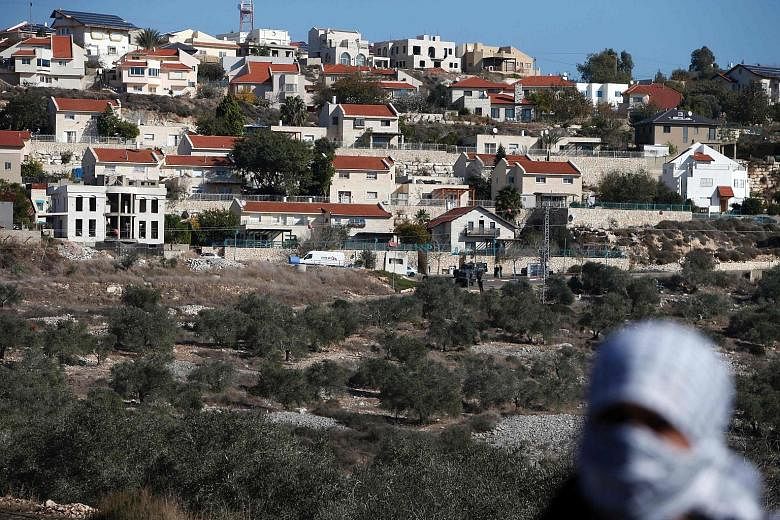UNITED NATIONS • Defying pressure from US President-elect Donald Trump and lobbying by Israel, the Obama administration refrained from vetoing a resolution condemning Israeli settlement construction in Palestinian territory.
The abstention enabled the adoption on Friday of the first United Nations resolution since 1979 to condemn Israel over its settlement policy. It also reflected the Obama administration's accumulated frustration over the accelerated growth of Israeli settlements.
The major rebuff to Israel could increase its isolation over the paralysed peace process with its Palestinian neighbours, who have sought to establish their own state on territory held by Israel.
Applause broke out in the 15-member Security Council's chambers after the vote on the measure, which passed 14-0, with US Ambassador Samantha Power raising her hand as the lone abstention.
Israel's Ambassador Danny Dan- on denounced the measure and castigated those who had approved it.
-
Where the settlements are
-
More than 230 settlements have been built by Israelis on occupied land in the West Bank and East Jerusalem over the past half-century.
Israeli settlements are seen as a major stumbling block to peace efforts, as they are built on land the Palestinians consider part of their future state.
The United Nations maintains that the settlements are illegal, and UN officials have reported a surge in construction over the past months.
Some 430,000 Israeli settlers currently live in the West Bank and a further 200,000 Israelis live in East Jerusalem, which Palestinians see as the capital of their future state.
REUTERS, AGENCE FRANCE-PRESSE
"Would you ban the French from building in Paris?" he told them.
The resolution describes the settlement building as a "major obstacle" to peace and demands that Israel stop the construction, which most of the world regards as illegal.
Israeli Prime Minister Benjamin Netanyahu also denounced the measure, saying in a statement: "At a time when the Security Council does nothing to stop the slaughter of half a million people in Syria, it disgracefully gangs up on the one true democracy in the Middle East, Israel, and calls the Western Wall 'occupied territory'."
Friday's vote came a day after Mr Trump personally intervened to keep the measure, originally proposed by Egypt, from coming up for a vote on Thursday, as scheduled. Mr Trump and Mr Netanyahu spoke to Egyptian President Abdel Fattah al-Sisi. Egypt postponed the vote under what its UN ambassador called intense pressure.
But in a show of mounting exasperation, four other countries on the Security Council - Malaysia, New Zealand, Senegal and Venezuela - all of them relatively powerless temporary members with rotating two-year seats, snatched the resolution away from Egypt and put it up for a vote on Friday. Israel retaliated by recalling its ambassadors to New Zealand and Senegal.
The Obama administration has criticised Israel's settlement building, describing it as an impediment to a two-state solution in the Israeli-Palestinian conflict that has long been the official US position, regardless of the party in power.
Mr Trump, who had urged the Obama administration to veto the resolution, has made clear he will take a far more sympathetic approach to Israel when his administration assumes office on Jan 20.
His comments on the resolution amounted to his most direct intervention on US foreign policy during his transition to power.
Minutes after the vote was announced, he made his anger known in a Twitter posting, saying: "As to the UN, things will be different after January 20th."
Ms Power said the US chose not to veto the resolution, as it had done to a similar measure under President Barack Obama in 2011, because settlement building had accelerated so much that it had put the two-state solution in jeopardy, and because the peace process had gone nowhere.
"Today the Security Council reaffirmed its established consensus that settlements have no legal validity," she said. "The United States has been sending a message that settlements must stop privately and publicly for nearly five decades."
NYTIMES, AGENCE FRANCE-PRESSE
SEE INSIGHT

